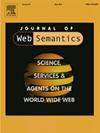The ESW of Wikidata: Exploratory search workflows on Knowledge Graphs
IF 3.1
3区 计算机科学
Q3 COMPUTER SCIENCE, ARTIFICIAL INTELLIGENCE
引用次数: 0
Abstract
Exploratory search on Knowledge Graphs (KGs) arises when a user needs to understand and extract insights from an unfamiliar KG. In these exploratory sessions, the users issue a series of queries to identify relevant portions of the KG that can answer their questions, with each query answer informing the formulation of the next query. Despite the widespread adoption of KGs, the needs of current KG exploration use cases are not well understood. This work presents the “Exploratory Search Workflows” (ESW) collection focusing on real-world exploration sessions of an open-domain KG, Wikidata, conducted by 57 M.Sc. Computer Engineering students in two advanced Graph Database course editions. This resource includes 234 real exploratory workflows, each containing an average of 45 SPARQL queries and reference workflows that serve as gold-standard solutions to the proposed tasks. The ESW collection is also available as an RDF graph and accessible via a public SPARQL endpoint. It allows for analysis of real user sessions, understanding query evolution and complexity, and serves as the first query benchmark for KG management systems for exploratory search.
维基数据的ESW:知识图上的探索性搜索工作流
当用户需要从不熟悉的知识图中理解和提取见解时,就会出现知识图的探索性搜索。在这些探索性会话中,用户发出一系列查询,以确定KG中可以回答他们问题的相关部分,每个查询答案通知下一个查询的公式。尽管KG被广泛采用,但当前KG勘探用例的需求还没有得到很好的理解。这项工作展示了“探索性搜索工作流”(ESW)集合,重点关注开放域KG Wikidata的现实世界探索会议,由57名计算机工程硕士学生在两个高级图形数据库课程版本中进行。该资源包括234个实际的探索性工作流,每个工作流平均包含45个SPARQL查询和参考工作流,作为建议任务的金标准解决方案。ESW集合也可以作为RDF图使用,并通过公共SPARQL端点进行访问。它允许分析真实的用户会话,理解查询演变和复杂性,并作为用于探索性搜索的KG管理系统的第一个查询基准。
本文章由计算机程序翻译,如有差异,请以英文原文为准。
求助全文
约1分钟内获得全文
求助全文
来源期刊

Journal of Web Semantics
工程技术-计算机:人工智能
CiteScore
6.20
自引率
12.00%
发文量
22
审稿时长
14.6 weeks
期刊介绍:
The Journal of Web Semantics is an interdisciplinary journal based on research and applications of various subject areas that contribute to the development of a knowledge-intensive and intelligent service Web. These areas include: knowledge technologies, ontology, agents, databases and the semantic grid, obviously disciplines like information retrieval, language technology, human-computer interaction and knowledge discovery are of major relevance as well. All aspects of the Semantic Web development are covered. The publication of large-scale experiments and their analysis is also encouraged to clearly illustrate scenarios and methods that introduce semantics into existing Web interfaces, contents and services. The journal emphasizes the publication of papers that combine theories, methods and experiments from different subject areas in order to deliver innovative semantic methods and applications.
 求助内容:
求助内容: 应助结果提醒方式:
应助结果提醒方式:


